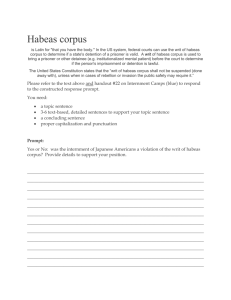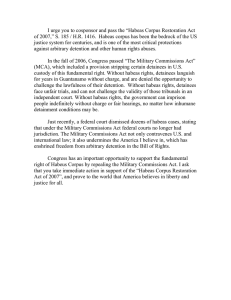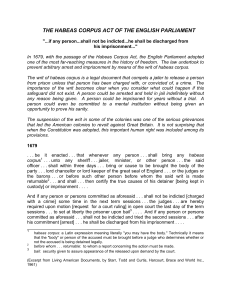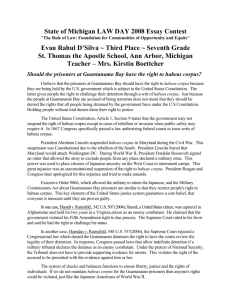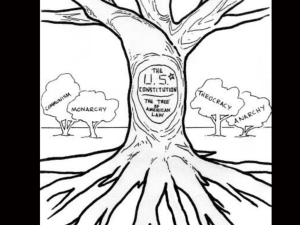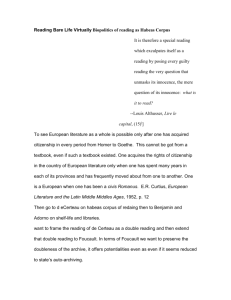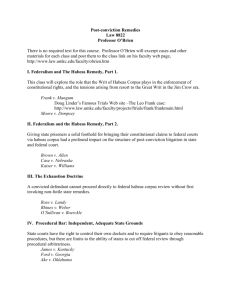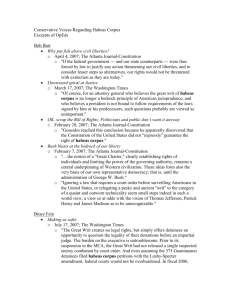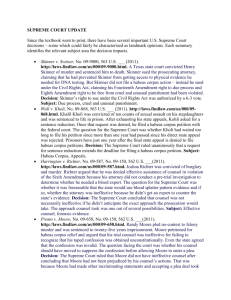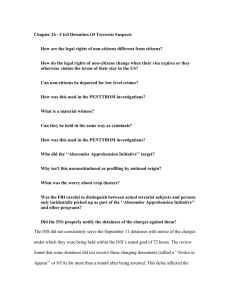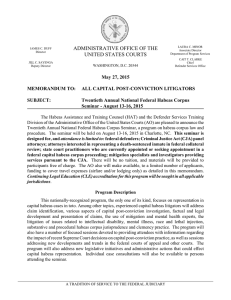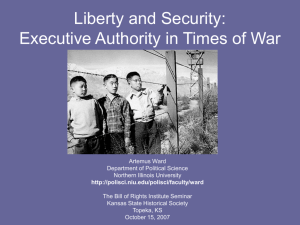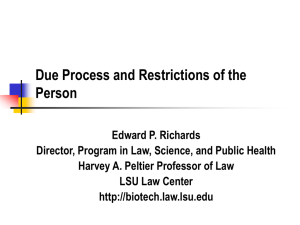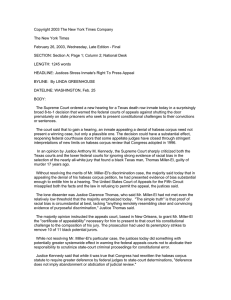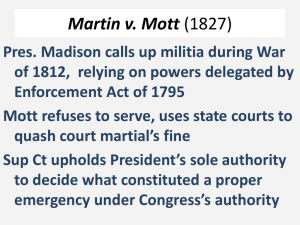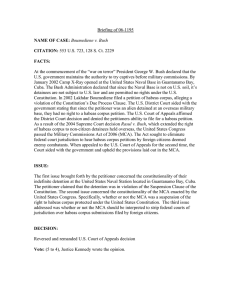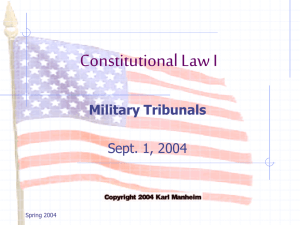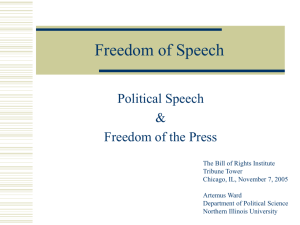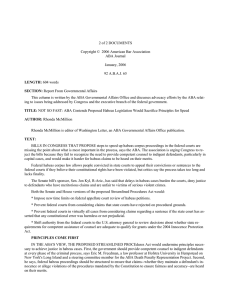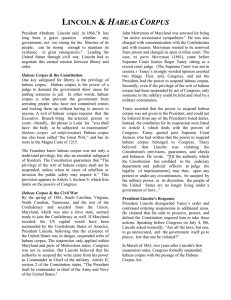Detention of Enemy Combatants
advertisement
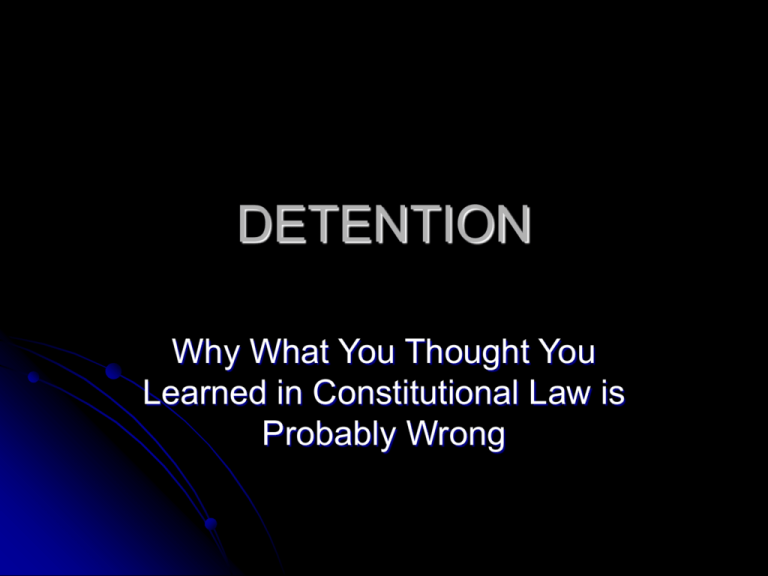
DETENTION Why What You Thought You Learned in Constitutional Law is Probably Wrong Overview Criminal imprisonment Administrative detention under the police power (quarantines) Class based detentions The peculiar institution of "legal" aliens How these turn into PETTBOM and GITMO Why we do not want to provide legal process Criminal Imprisonment The classic model Criminal due process Bail with limited exceptions Right to appointed counsel Right to trial by jury Speedy trials Proof beyond a reasonable doubt Protection again unreasonable search and seizure Protection against self-incrimination Access to habeas corpus Roots of the Police Power For ten years prior, the yellow fever had raged almost annually in the city, and annual laws were passed to resist it. The wit of man was exhausted, but in vain. Never did the pestilence rage more violently than in the summer of 1798. The State was in despair. The rising hopes of the metropolis began to fade. The opinion was gaining ground, that the cause of this annual disease was indigenous, and that all precautions against its importation were useless. But the leading spirits of that day were unwilling to give up the city without a final desperate effort. The havoc in the summer of 1798 is represented as terrific. The whole country was roused. A cordon sanitaire was thrown around the city. Governor Mifflin of Pennsylvania proclaimed a nonintercourse between New York and Philadelphia. (Argument of counsel in Smith v. Turner, 48 U.S. (7 How.) 283, 340-41 (1849)) Administrative Detentions: Quarantine Model Protection of the public, not punishment Limited rights under the US Constitution No appointed counsel No bail Proof by preponderance of the evidence No trial by jury Lasts as long as the danger Can be done in prison Access to habeas corpus Deference to the agency Expansion of the Administrative Detention Model Material witnesses Bail Reform Act Bell v. Wolfish, 441 U.S. 520 (1979) U. S. v. Salerno, 481 U.S. 739 (1987) Redefining imprisonment for sex offenders Allen v. Illinois, 478 US 364 (1986) Kansas v. Hendricks, 117 S.Ct. 2072 (1997) Key legal issue Is it punishment or prevention? Class Based Detentions Korematsu v. United States, 323 U.S. 214 (1944) Japanese on the WEST coast The order was to move them inland, but the locals objected Ex parte Mitsuye Endo, 323 U.S. 283 (1944) The case that explains it all The court ruled that a person could not be held if it was determined that he was not a threat Combatants: Ex parte Quirin, 317 U.S. 1 (1942) The German Spy Case Arrested in the U.S. One was a US citizen Were to be tried by a military tribunal as unlawful combatants United States Supreme Court ruled that unlawful combatants, even if U.S. citizens, could be tried by military tribunals Not overruled by Reid v. Covert, 351 U.S. 487 (1956) Immigrants: Legal and Illegal The Constitution gives congress plenary power over immigration. Immigration detention and deportation is an administrative proceeding No constitutional right to enter or stay in the US A naturalized citizen can be stripped of citizenship for fraud Process defined by congress Few due process rights What does this mean in real life? Enemy Alien Act Whenever there is a declared war between the United States and any foreign nation or government, or any invasion or predatory incursion is perpetrated, attempted, or threatened against the territory of the United States by any foreign nation or government, and the President makes public proclamation of the event, all natives, citizens, denizens, or subjects of the hostile nation or government, being of the age of fourteen years and upward, who shall be within the United States and not actually naturalized, shall be liable to be apprehended, restrained, secured, and removed as alien enemies. PENTTBOM and GITMO PENTTBOM The FBI Investigation into 9/11 Rounded up about 5,000 young Muslim men Deported most of them with any technical visa problems Detained them for long period in poor conditions with limited or no access to counsel GITMO Why Not Give Everyone Habeas Corpus? What does habeas corpus mean? Then why worry about it? The importance of isolation Do you automatically get out? Do you get to try your case? Human interrogation depends on it What does a lawyer tell a client? What else can a lawyer do? If you give them habeas corpus, do you have to torture them?
